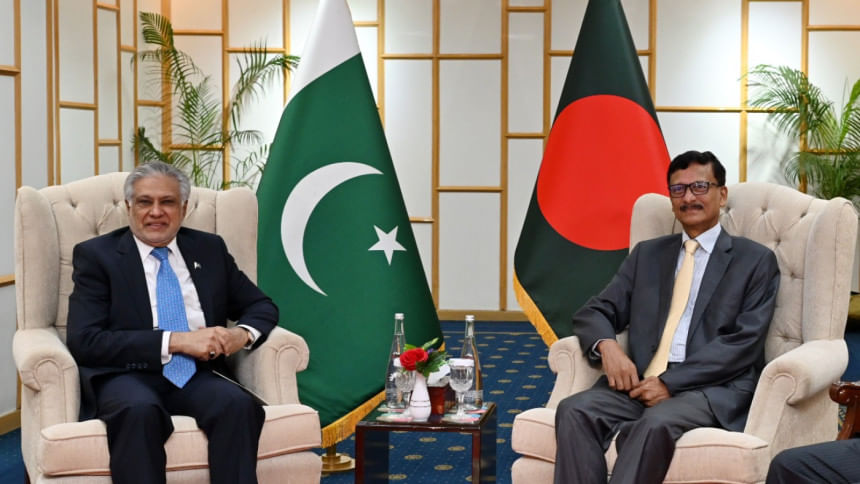Pak FM claims 1971 issues settled twice; Dhaka disagrees
Bangladesh and Pakistan differed on the unresolved issues of 1971 but expressed willingness to advance bilateral relations, boost trade and commerce, and collaborate in regional and global forums during their first bilateral meeting in 13 years, held in Dhaka yesterday.
Foreign Adviser Touhid Hossain and visiting Pakistani Foreign Minister Ishaq Dar held the meeting at the Pan Pacific Sonargaon.
The issues that remain unresolved between the two countries include a formal apology from Pakistan for the atrocities it committed in 1971 and the repatriation of stranded Pakistanis. Dhaka also claims from Islamabad its share of assets in the pre-1971 Pakistan.
Speaking to journalists after the meeting, Dar, also the deputy prime minister, claimed the issues were resolved once in 1974 and again in the early 2000s when then-president Pervez Musharraf visited Bangladesh.
He said, “The document of that time [1974] is historic and is available in both countries.”
Without directly referring to any of the issues, Dar just said: “He [Pervez Musharraf] actually addressed that issue in a candid manner …. and I think between a family, between brothers, once this is done, even Islam tells us to clean your heart.”
He said the two nations should focus on moving forward instead of looking back.
Asked if he accepted the claims made by the Pakistan minister, Foreign Adviser Touhid said, “No, I don’t. If I did, the problem would have been solved.
“Bangladesh’s position is clear: we want settlement of financial accounts, a formal apology for 1971, and repatriation of stranded Pakistanis. We strongly presented our position. And they also presented theirs.”
Touhid was speaking to journalists at the Foreign Service Academy following the meeting.
“However, we acknowledged that the issues of 1971 cannot be solved in a day and agreed to continue discussions to that end,” he added.
Dar’s visit, the third ministerial trip since the political changeover in Bangladesh last year, is an effort to boost ties that went frosty after Pakistan condemned the 2013 execution of Jamaat leader Abdul Quader Mollah for 1971 war crimes.
Pakistan’s interior minister visited Dhaka in July, after a 15-year hiatus, while its Commerce Minister Jam Kamal Khan arrived here on August 21 to advance trade relations.
Bilateral trade reached $865 million in FY 2024-25, with Bangladesh’s exports rising 20 percent to $78 million and Pakistan’s exports up 28 percent.
Touhid said both sides emphasised the need to expand trade and investment, but Dhaka highlighted the trade imbalance.
“We sought greater market access in Pakistan, especially under SAFTA, for our textiles, energy, pharmaceuticals, agro-products, and IT sector,” he said, adding that there is potential in agriculture, fisheries, and livestock, while Pakistan mentioned initial interest in energy exports.
Dhaka requested regular operations of ships between Chattogram and Karachi, he said, adding that both sides gave preliminary consent to two airlines as a means of boosting trade and tourism.
Both countries spoke on increasing scholarships for students, cooperation in culture, sports, and academics, while agreeing to continue cooperation in other forums, as SAARC is non-functional.
After the meeting, the two countries signed six instruments — one agreement on visa exemption for diplomatic and official passport holders and five Memoranda of Understanding (MoUs).
The MoUs were signed on establishing a Joint Working Group on Trade; on cultural exchanges; between the two Foreign Service Academies; between Bangladesh Sangbad Sangstha (BSS) and Associated Press of Pakistan; and between Bangladesh Institute of International and Strategic Studies and the Institute of Strategic Studies, Islamabad.
Ishaq Dar had a breakfast meeting with Bangladesh Commerce Adviser Sk Bashir Uddin, which was also attended by Jam Kamal Khan.
Asked if frequent engagements with Pakistan are driven by China’s push for a trilateral mechanism, Touhid said they were not.
“While China and Pakistan have an interest in such trilateral initiatives, we told them we prefer broader, even quadrilateral, engagement with more countries,” he said.
The adviser added that Bangladesh’s relations with Pakistan had been deliberately sidelined under the previous regime, and the current government aims to normalise them, as it seeks normal relations with all countries.
LondonGBDESK//



Comments are closed.